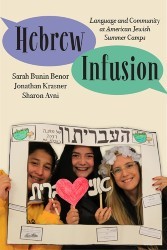Against the backdrop of Jewish summer camp, On Blackberry Hill depicts two narratives; the chapters alternate between fourteen-year-old Reena in the present day and her late mother Naomi twenty-years ago. Though Reena’s story is more fleshed-out, Naomi’s chapters provides necessary insight to their family story.
When her musician father goes on tour in Japan, Reena is forced to join her standoffish cousin Lila at Camp Tova, a Jewish sleep-away camp. Chagrined to be away from her New York City home, Reena has trouble adjusting to camp and her fellow bunkmates. However, she is intrigued by the opportunity to learn more about her mother, who died when she was a baby, in the place her parents met two decades prior.
Twenty summers earlier, college student Naomi is a reluctant counselor at Camp Tova. Forbidden by her strict parents from spending the summer in New York City, Naomi is focused on the future and torn between her parents’ expectations and personal independence, especially in comparison with her more traditional sister, Mara.
Despite a rough start, Reena finds her place as a camper (and even makes friends) and eventually discovers the stories behind her family history. She learns that the reasons for the tension between her father and her mothers’ family, particularly with her Aunt Mara, are not what she always assumed.
Mann clearly put a lot of effort into including various Judaic aspects into the story and sufficiently incorporates many Jewish elements including several mentions of religious prayers, traditions and Hebrew and Yiddish words. On Blackberry Hill depicts the value of multi-generational familial bonds and the journey towards self-discovery which teens (especially those familiar with the often insular Jewish sleep-away camp culture) will enjoy reading.
The target age range for this novel is not clear. Although Reena is 14, Naomi’s chapters includes a few mature thematic elements. As kids tend to “read up” age-wise, some of the content may not be appropriate for pre-teen readers.



